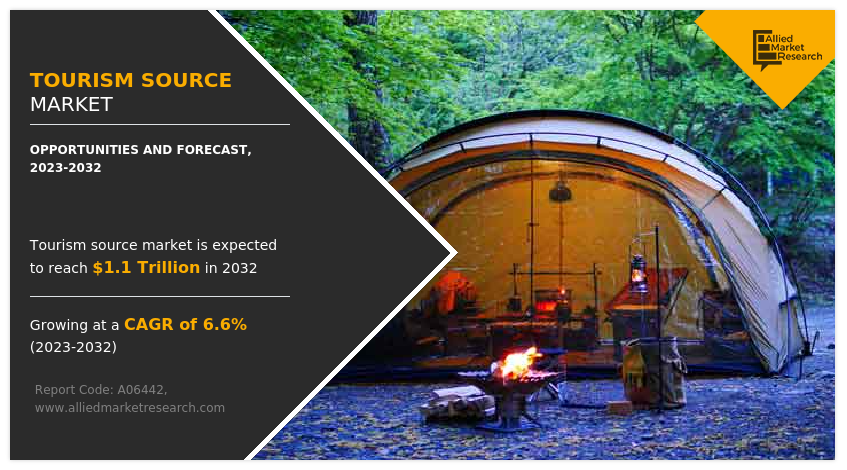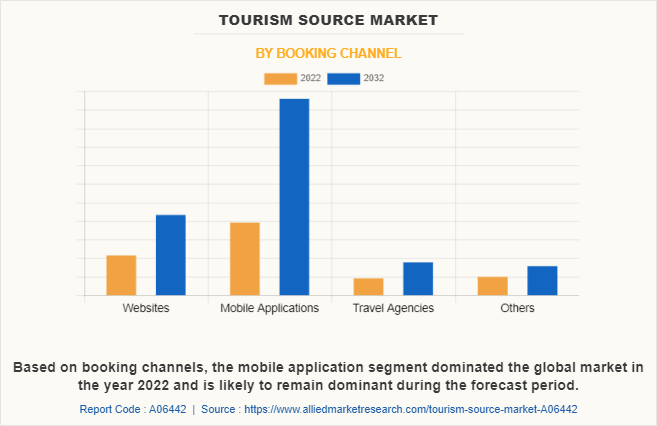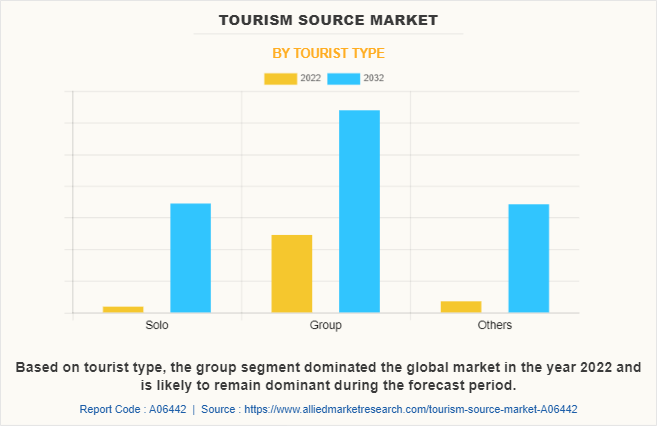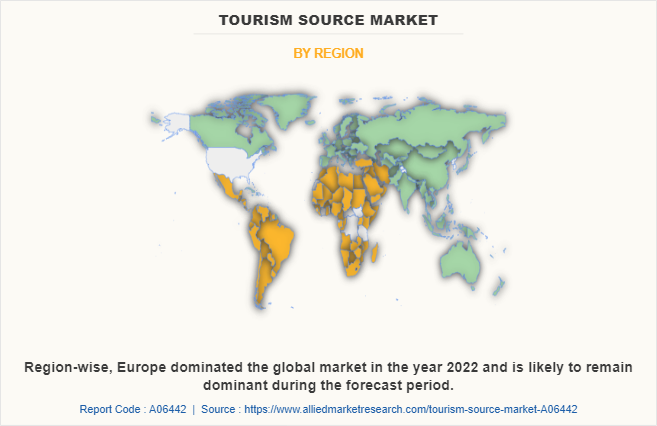Tourism Source Market Research, 2032
The global Tourism Source Market Size was valued at $599.4 billion in 2022, and is projected to reach $1.1 trillion by 2032, growing at a CAGR of 6.6% from 2023 to 2032.Traveling to other locations for pleasure, recreation, or business is referred to as tourism. It entails traveling to and taking in a variety of locations, points of interest, and cultural landmarks outside of one's normal milieu. A wide variety of activities can be included in tourism, including sightseeing, exploring natural landscapes, participating in adventure sports, learning about other cultures, attending local events, or just unwinding at resorts or vacation spots. Increased outbound tourism is a result of increased exposure to different cultures, traditions, and lifestyles globally thanks to the globalization of media and the internet. The emergence of low-cost airlines and cost-effective alternatives like package deals and low-cost lodging has also increased travel accessibility, enabling a wider spectrum of people to travel fueling an increase in outbound tourism. The demand for tourism is also influenced by the culture of recreational activity, as people are drawn to go to various locations to take part in a range of alluring activities.
Increased outbound tourism is a result of increased exposure to different cultures, traditions, and lifestyles globally thanks to the globalization of media and the internet. The emergence of low-cost airlines and cost-effective alternatives like package deals and low-cost lodging has also increased travel accessibility, enabling a wider spectrum of people to travel fueling an increase in outbound tourism. The demand for tourism is also influenced by the culture of recreational activity, as people are drawn to go to various locations to take part in a range of alluring activities.
Hiking, trekking, scuba diving, skiing, and other popular adventure activities draw tourists to locations known for providing these experiences, boosting the outbound tourism sector. Another significant trend is wellness and spa tourism, which draws tourists to locations known for their stunning natural scenery, hot springs, and wellness retreats. This niche industry stimulates outbound travel as people look for restorative and self-care activities. Additionally, the desire to immerse themselves in various cultures, traditions, festivals, and historical sites drives a lot of travelers. They visit distant nations or even various areas inside their own nation to experience and participate in regional customs and heritage, thereby boosting the outbound tourism business.
In addition, to foster Tourism Source Market growth, governments around the world have implemented various initiatives and policies aimed at promoting sustainable and inclusive development. These initiatives focus on creating an enabling environment for tourism businesses, improving infrastructure, preserving natural and cultural assets, and enhancing the overall competitiveness of the tourism sector.
Governments have created rules to encourage environmentally and socially responsible practises in the tourism industry because they understand how important sustainable tourism is for long-term success. These regulations support the adoption of sustainable practises by the tourism industry, such as reducing environmental effect, assisting local communities, and safeguarding cultural heritage.
To improve connectivity and accessibility, which is essential for drawing tourists from Tourism Source Market, governments invest in infrastructure development. This entails building tourist hotels, extending airports, modernizing highways, and boosting transit networks. Governments hope to facilitate travel for tourists and give them a comfortable journey by enhancing infrastructure.
Governments actively promote their destinations to source markets through marketing campaigns. To promote the distinctive sights and experiences that their nations have to offer, they work together with tourism boards, travel organizations, and business sector stakeholders. To raise awareness and draw tourists from source markets, marketing efforts, participation in international travel fairs, and internet marketing techniques are used.
Small and medium-sized businesses (SMEs) are very important in the tourism industry. To assist the growth of SMEs, governments offer financial incentives and policy support. This entails making finance more accessible, providing training and capacity-building programs, and encouraging cooperation between SMEs and bigger tourism businesses. Supporting SMEs promotes entrepreneurship and diversifies the tourism industry.
However, inadequate support infrastructure at ecotourism destinations like limited air, rail, or road connectivity to various ecotourism destinations in developing and underdeveloped countries are major challenges to the proliferation of ecotourism. Furthermore, low availability of accommodation along with limited availability of quality and hygienic restaurants, food outlets, and hotels at destinations hampers the growth of ecotourism tourist arrivals particularly in developing regions. In addition, the monopoly of few tourists guides along with insufficient availability of certified and trained tourist guides aggravate the risk of exploitation of tourists.
In 2023, the tourism sector is anticipated to see some limitations. The difficult economic environment is one of the primary reasons limiting the expansion of the tourism market. Tourists are expected to visit more frequently closer to home as a result of economic uncertainty, even though international arrivals are predicted to return to pre-pandemic levels in some places. The economy's slowdown, the rebound in Asia and the Pacific, and geopolitical issues like the development of Russia's war in Ukraine may have an impact on how much the number of foreign visitors increases in 2023. The Tourism Source industry is expected to have a solid year overall despite the numerous difficulties, such as the economic crisis and ongoing geopolitical uncertainties.
The demand for tourist services has significantly increased because of the increase in travelers’ desire to travel to new locations domestically and abroad, as well as the culture of participating in recreational activities. As a result, a rise in Tourism Source Market Demand is anticipated in the tourist source market during the Tourism Source Market Forecastperiod.
The rise in local and international tourism to national parks, historical sites, and cultural events is indicative of this trend. For instance, there has been a rise in desire among travelers in recent years to discover lesser-known locations and off-the-beaten-path experiences, such as ecotourism, adventure tourism, and cultural immersion activities. As a result, new tourism-related goods and services have been created to meet the needs of these niche markets, growing the tourism sector. Furthermore, the popularity of social media has made it simpler for individuals to share their travel tales, encouraging others to set out on similar journeys.
The Tourism Source industry presents numerous market opportunities for various sectors. As of 2021, the total contribution of travel and tourism to the global GDP was significant, accounting for 10.4% of the global GDP. Tourism has the potential to create productive and inclusive jobs, foster economic empowerment, and contribute to the conservation of natural and cultural assets. Moreover, the tourism market has experienced growth and is projected to continue expanding in the coming years.
One market opportunity in the tourism industry is domestic tourism. The COVID-19 pandemic has significantly impacted international travel, leading to the rise of domestic tourism as a viable alternative. Domestic tourism refers to travel within one's own country for leisure, business, or other purposes.
Segmental Overview
The tourism source market is segmented into booking channels, tourist types, and regions. By booking channel, the market is classified into websites, mobile applications, travel agencies, and others. The market is categorized into solo, group, and others depending on tourist type. Region-wise, the market is divided across North America (the U.S., Canada, and Mexico), Europe (UK, Germany, France, Italy, Spain, Russia, Sweden, Netherlands, Denmark, Poland, and Rest of Europe), Asia-Pacific (China, Japan, India, Australia, South Korea, Thailand, Malaysia, Singapore, Indonesia, New Zealand, and Rest of Asia-Pacific), and LAMEA (Brazil, Argentina, South Africa, Saudi Arabia, Egypt, UAE, and Rest of LAMEA).
By Booking Channel
Based on booking channels, the mobile application segment had the major Tourism Source Market Share in the year 2022 and is likely to remain dominant during the forecast period. The rise in popularity of smartphones and other mobile devices, as well as the development of mobile technology and the accessibility of online travel booking platforms, have contributed to the trend toward application booking for Tourism Source Market. Numerous tourism service providers have created user-friendly mobile applications that make it simple for tourists to browse and book travel services. For added convenience, some providers have also included features like tailored suggestions, real-time notifications, and in-app help.

By Tourist Type
As per tourist type, the group segment dominated the global market in the year 2022 and is likely to remain dominant during the forecast period. For group travelers, customized experiences are expanding the source tourism business in several ways. Customized tours appeal to the distinct interests and preferences of group travelers by offering personalized travel experiences, enabling them to create their own schedules, activities, and lodgings. As a result, the trip becomes immersive and fulfilling while still meeting the needs of the group.
Tailored experiences are also expanding the source tourism industry for group travelers by luring new visitor demographics that are looking for specialized and uncommon travel experiences. Customized excursions, for instance, may focus on a particular interest, like wine tasting, cultural history, or adventure sports. Customized tours can target traveler groups and set themselves apart by providing these exclusive experiences.

By Region
Region-wise, Europe dominated the global market in the year 2022 and is likely to remain dominant during the forecast period.
Europeans have a long history of traveling overseas for both work and pleasure. A variety of sites are easily accessible because of the area's well-established transport infrastructure, which includes broad air connectivity and effective rail networks.
When deciding where to go, European travelers have a plethora of possibilities, both inside Europe and abroad. The landscapes, historical sites, cultural attractions, and leisure pursuits available in European nations are diverse. Furthermore, long-distance locations like Asia, Africa, and the Americas are very popular among European tourists.
Europe has distinct travel patterns that are characterized by summer peak seasons and seasonal holidays like Christmas and Easter. During these times, a lot of Europeans travel during their free time. Off-peak travel is nevertheless getting more and more popular as people want to escape crowds and benefit from lower costs.

Key Benefits For Stakeholders
- This report provides a quantitative analysis of the market segments, current trends, estimations, and dynamics of the tourism source market analysis from 2022 to 2032 to identify the prevailing tourism source market opportunities.
- The market research is offered along with information related to key drivers, restraints, and opportunities.
- Porter's five forces analysis highlights the potency of buyers and suppliers to enable stakeholders make profit-oriented business decisions and strengthen their supplier-buyer network.
- In-depth analysis of the tourism source market segmentation assists to determine the prevailing market opportunities.
- Major countries in each region are mapped according to their revenue contribution to the global market.
- Market player positioning facilitates benchmarking and provides a clear understanding of the present position of the market players.
- The report includes the analysis of the regional as well as global tourism source market trends, key players, market segments, application areas, and market growth strategies.
Tourism Source Market Report Highlights
| Aspects | Details |
| Market Size By 2032 | USD 1.1 trillion |
| Growth Rate | CAGR of 6.6% |
| Forecast period | 2022 - 2032 |
| Report Pages | 250 |
| By Tourist Type |
|
| By Booking Channel |
|
| By Region |
|
| Key Market Players | Booking Holdings, Inc., Vueling Airlines SA, Iberia Express, S.A., TUI Group, Ryanair Group, TripAdvisor LLC, Delta Air Lines, Inc., Expedia, Inc., Airbnb, Inc., Italia Trasporto Aereo S.p.A. |
Analyst Review
With travel restrictions still common and traveler confidence hampered by pandemic concerns, the past few years have also seen a shift in Tourism Source Market Demand trends globally. According to the UNWTO Panel of Experts, the major trends driving the T&T (Travel and Tourism) recovery include domestic tourism, travel close to home, open-air activities, nature-based products, and rural tourism. The World Travel and Tourism Council (WTTC) data shows that on average for the 117 economies covered by the index, domestic spending’s share of T&T spending increased from 50.8% in 2019 to 62.6% in 2020 as domestic demand fared better than collapsing international demand. Moreover, current projections for 2021 show that domestic spending growth is expected to substantially outpace international spending in every region outside of the Caribbean and Middle East.
However, inadequate support infrastructure at ecotourism destinations like inadequate air, rail, or road connectivity to various ecotourism destinations in developing and underdeveloped countries are major challenges to the proliferation of ecotourism. Furthermore, low availability of accommodation along with limited availability of quality and hygienic restaurants, food outlets, and hotels at destinations hampers the growth of ecotourism tourist arrivals particularly in developing regions. In addition, the monopoly of few tourist guides along with insufficient availability of certified and trained tourist guides aggravate the risk of exploitation of tourists.
Tourism Source Market represents an opportunity to revitalize and diversify travel opportunities, promote local economic development, involve a wide range of professional sectors, and provide new uses for the primary sector. Hence, tourism contributes to the promotion and branding of destinations, the preservation of local traditions and diversity, and the harnessing and rewarding of authenticity. As a result, diverse cultural heritage at the local and regional levels creates lucrative opportunities for the growth of the tourism source market.
The global tourism source market was valued at $599.4 billion in 2022 and is projected to reach $1,113.1 billion by 2032, registering a CAGR of 6.6% from 2023 to 2032.
The top companies that hold the market share in the Source Tourism market are Ryanair Group, Vueling Airlines SA, Booking Holdings, Inc., Iberia Express, S.A., Italia Trasporto Aereo S.p.A., and TripAdvisor LLC.
Based on tourist type, the group segment dominated the global market in the year 2022. $599.4 billion is the market value of the Source Tourism market in 2022.
The Source Tourism market is analyzed across North America, Europe, Asia-Pacific, and LAMEA. 2022 is the base year calculated in the Source Tourism market report
Hiking, trekking, scuba diving, skiing, and other popular adventure activities draw tourists to locations known for providing these experiences, boosting the outbound tourism sector.
Loading Table Of Content...
Loading Research Methodology...



